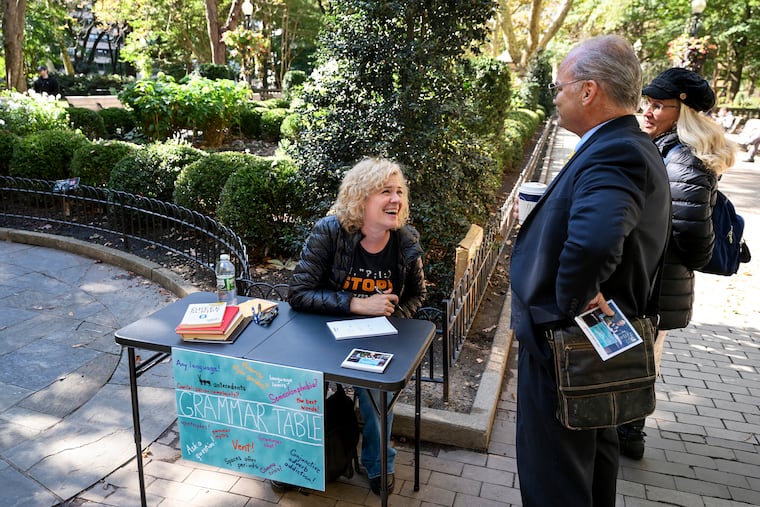Where can we turn to understand the vexing apostrophe? The Grammar Table, of course.
The grocer’s apostrophe is not uncommon in the Philadelphia area.

Ellen Jovin sat in Rittenhouse Square at a table she’d hauled from her Manhattan home.
Author of Rebel With a Clause, one of her four books on language, Jovin travels from city to city with what she calls her “Grammar Table” to discuss commas, participles, prepositions, and the universally vexing apostrophe.
Jovin empathizes with those caught up in what Peter Sokolowski, editor at large at Merriam-Webster, calls the “great apostrophe plague, becoming more noticed in recent years.”
It’s the practice of placing an apostrophe before the letter “s” of a plural word, sometimes called the “grocer’s apostrophe,” because it’s often seen on signs in stores: “Banana’s On Sale,” for example, or “Mangoe’s $6 per carton.”
As it happens, the grocer’s apostrophe is not uncommon in the Philadelphia area.
In a Pilesgrove, Salem County, flea market, a handwritten sign announced “Ice Cold Soda’s.” In Frankford, a large outdoor sign heralded a breakfast / lunch spot called “Donut’s Queen” (officially it’s “Donuts Queen”).
“You can also see the grocer’s comma on menus, and it irritates a lot of people,” Jovin said. “I get uncomfortable when people get nasty about it.”
Local sign manufacturers understand. “Apostrophes in the wrong place on signs?” said John Nolen, owner of Aztec Signs & Graphics in Northeast Philadelphia. “Oh God, yes.”
He often tells customers that elements they want on their signs are incorrect: There was the store owner who insisted the word refrigerator be spelled “frigerator.” And, Nolen dealt with a property clean-out business whose owner believed the phrase, “Ayy my man” was one word, and had his sign created that way.
“All I can do is suggest,” Nolen said. “I’ll say, ‘You need an ‘e’ there, or an ampersand.’ They disagree. As a result, I’ve knowingly put up misspelled or ungrammatical signs.”
A lifelong Philadelphian, Nolen concluded, “Grammar here is getting progressively worse with each generation.”
Not true, said Alexine Fleck, an English professor at the Community College of Philadelphia.
“As far back as I know,” Fleck said, “there’s been hand-wringing about young people ruining the language.
“Let me tell you, overall, Philadelphia grammar is just fine.”
While precise rules may not always be followed, she said, people are making themselves understood. “To do a lot of jobs out there, you don’t really have to make your subjects agree with your verbs,” she said.
But, Freck stressed, she teaches her students to write academic papers with proper grammar because many workplaces still demand it.
The Grammar Table
At the Grammar Table, Jovin, 57, was armed with a pad and a pen, a reference book, and a few grammar questions she proposed to engage passersby.
She offered to “solve spousal disputes and classroom debates,” all while espousing the “joy, flexibility, and mutability of language.”
Enlightened without being pedantic, she called out to a man, “I can tell you have grammar curiosity. Come over, nothing bad happens here.”
This being Philadelphia, the city of the quid pro quo, Rittenhouse denizens demanded to know what Jovin got out of this.
“What’s the suggested donation?” asked a man in a tweed coat who was inquiring about ellipses.
“Nothing,” Jovin responded.
“Are you selling books or something?” a woman with a backpack wondered.
“Not at all,” was the answer.
It’s simply “linguistic hedonism” that gets the rebel going. “I just love road trips, grammar, and chatting with strangers,” said Jovin, cofounder of a communication skills training firm, Syntaxis, with her husband, Brandt Johnson. Johnson filmed a Grammar Table documentary, yet to be released.
Jovin has set up her table in all 50 states; this was her first time talking gerunds in Philadelphia.
“It’s amazing to meet you,” Lucas Schrier, 21, a University of Pennsylvania junior majoring in English and history, said to Jovin. “I saw on social media you’d be here.”
Soon enough, Jovin and Schrier, an editorial assistant at a poetry journal, were embroiled in a wide-ranging geek-fest on dashes and commas. Then the American bugaboo, the apostrophe, came up.
“How would you form the plural possessive of Jones, as in a house belonging to the Jones family?” asked Jovin, playfully nudging the conversation along.
“I’d add an apostrophe and call it a day,” Schrier said.
“Actually,” Jovin said, “you’d write the Joneses’ house.” She quickly added, “Sometimes, people get indignant when I say that. Are you having fun or is this a bummer?”
Also consumed by the apostrophe, Tony Pullano, 62, a retiree from Reading, discussed the possessive of Jesus. Jovin said experts differ, with some saying Jesus’s, and others going with Jesus’.
These days, Jovin said, the grammar trend is that “well-informed editors aren’t as inflexible as before.”
Jovin has sympathy for folks driven batty by inconsistent grammar rules, but added, “Grammar simply becomes a way of looking at words that enable us to communicate and live together.
“Grammar is something beautiful.”